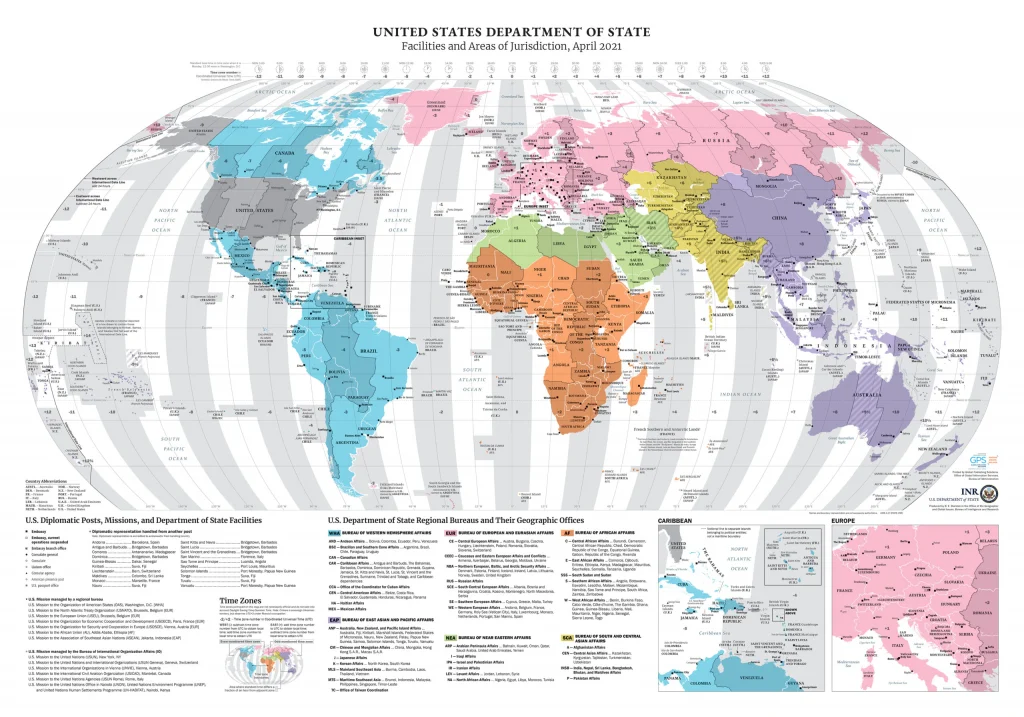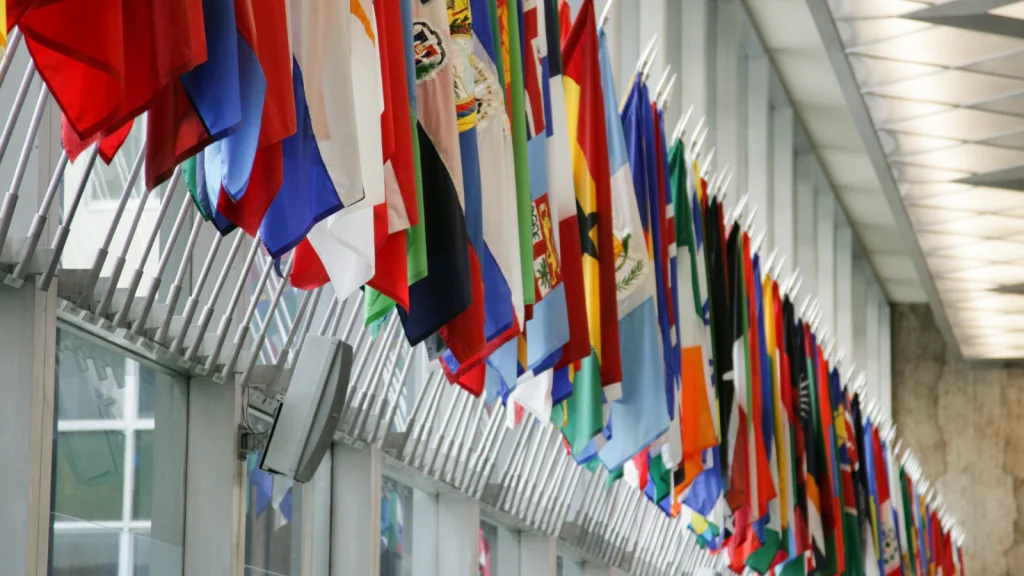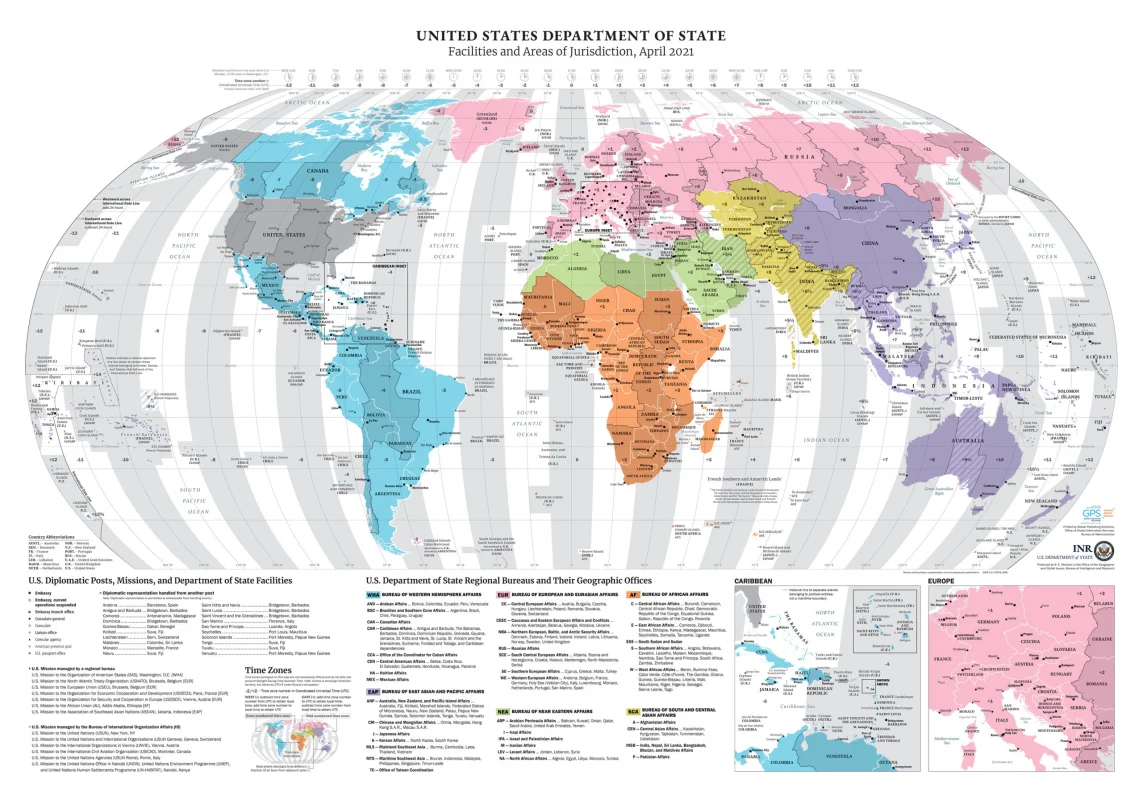Foreign Service Orientation (aka A-100 or SOAR) is 6 weeks long… then after that comes more training, specific to what your job is, and where you’re going. There are close to 200 of us brand new baby diplomats, and we’ll be sent all over the world…

…but we don’t know where yet. Early in orientation, each of us got a list of places we might go and a chance to provide feedback about where we wanted to go. The running joke is that the power-that-be send us wherever, regardless of our preferences, but that asking us first makes us feel better about the whole process. Actually, the assignment-giver-outers do consider our preferences, but at the end of the day, the country needs diplomats all over the world, and we’ve already agreed to go wherever we’re needed.
As the poet Aesop* said, we’re darts in a map.

In a few days, we all find out where we’re going in a great tradition called Flag Day. All of us students will gather in a meeting hall, and someone gives someone flags of someplace… and then something, something, VOILA! FLAG DAY! The only detail I know is the one that matters: our family will learn what our 1st post is, and I’ll get a cute little flag of the country.

So what comes next?
Some of our class will be here for a few months longer, learning how to do their specific jobs. Others will be here for a year or more, learning languages. As a medical provider, I already know how to do my job (in theory 😁), and I don’t get any language training (😔), so me and my MED pals will be outta here in no time. 6 weeks or so. Just long enough to learn how to medevac sick folks and biz.
So what the h*ck have I been doing the past 5 weeks?
- Typical HR stuff: classes on making a respectful workplace, learning the history of the organization, etc.
- Typical technical stuff: getting a security badge, learning how to use the various systems and programs of the State Department, etc.
- Atypical technical stuff: learning about the security measures that are in place to protect State people, information, and facilities.
- Teambuilding taken to the next level: this is not trust-falls and kumbayas; this has been complex (but mostly fun!) exercises where we’ve had to really work and rely on our new colleagues.
We also learned just a little State Department history, including some dark chapters:
We learned about the Lavender Scare, “a moral panic about homosexual people in the United States government which led to their mass dismissal from government service during the mid-20th century.”
We watched an enlightening presentation from Professor Michael Krenn, discussing the history of discrimination against blacks in the State Department. He was kind enough to correspond with me afterward!
We discussed people who have dissented, or resigned in protest, to nudge the State Department in a better direction. We learned about the various release valves to vent pent-up angst that can come from working for a President you didn’t vote for.
There are two purposes to studying the mistakes of the State Department in the past. We learn about them so that we don’t repeat them. We also learn that the State Department is an organization that’s willing to wrestle with its own shortcomings. Improvement is rarely straightforward, fast enough, or thorough enough, but it’s been reassuring to hear people inside the state department be so willing to criticize it (though they are fastidious to keep politics out of discussions!)
The trolls of the world (including some close to our family!) shout, “if you criticize America so much, why don’t you LEAVE?” Theirs is an imitation patriotism, fragile and hollow, because it implies, “You should only love something if it’s perfect.” What a tragic way to approach a relationship, whether with people or a nation. With that mindset, it is impossible to confront past mistakes, or grow in the future, because either would shatter the illusion of America as a “perfect” nation. Mature love loves in spite of imperfection and works to overcome. The writers of the constitution understood that this work would never be done: The United States was not formed as a “perfect” Union but a “more perfect” one than what came before.
We will not march back to what was
but move to what shall be:
a country that is bruised but whole,
benevolent but bold,
fierce, and free.
Amanda Gorman, “the Hill we climb”
America is a stronger nation because it doesn’t demand loyalty automatically, but rather strives to be worthy of it. It’s stronger still when it doesn’t whitewash its imperfections but strives to overcome them. I love the ideals this country stands for: equality, life, liberty, and the pursuit of happiness. These weeks of orientation have been a welcome time to reflect on the transition our family is making to being a Foreign Service family, and on our place in the work of the United States abroad.
*Aseop Rock, the poet rapper. Not Aesop the fabulist.
